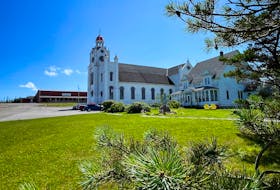Newfoundland’s connection with the Holocaust doesn’t end with local survivors. It includes local people who were once on the front lines, fighting for the lives and freedom of Jews, as well.
The Beth-El synagogue in St. John’s traditionally holds an annual Holocaust memorial service and has done so for years. This year will be no different, although the focus will shift to include education as well as remembrance and honour.
“It’s good to do a ceremony, and a memorial is very important, too, but as we get further and further away, we have very few survivors,” said Claire Frankel-Salama, synagogue president, adding there are just two Holocaust survivors remaining in the congregation. “It’s very, very important to push the education aspect now, as well.”
As part of the new emphasis, the synagogue is presenting a screening of the 2008 Oscar-nominated movie “Defiance” Monday evening.
Starring Daniel Craig, Liev Schreiber, Jamie Bell and George MacKay, the film is set during the Nazi occupation of Belarus and is based on the story of the Jewish Bielski brothers, who escaped from Nazi-occupied Poland into the Belarussian forest, where they joined Russian resistance fighters and built a village in an attempt to protect people in danger.
“The Bielski story is just part of a larger story of the partisans, who were Russian, Polish, Jewish — they tended to fight in their own ethnic groups, because they felt more comfortable — and they played a major role behind the lines in disrupting German communication lines and transportation,” explained Elliott Leyton, congregation member and professor emeritus of anthropology at Memorial University, who’ll be giving a short talk to introduce the film.
The partisans took an active part in fighting the Germans, often sabotaging bridges and telegraph lines, and were once successful in halting German trains for more than 51 hours.
“There was a fairly large partisan band, about 1,200 people, and they saved a lot of people’s lives,” Leyton said. “The Germans sent a quarter of a million people to that area to kill (them) off, and they survived it. Pretty impressive.”
The film has a Newfoundland connection. As The Telegram reported shortly after “Defiance” was released, at least two Newfoundland families were members of the partisans and fought beside the Bielski brothers in Belarus.
Irving and Ruth Resnik, who had met in a refugee camp for displaced persons, were brought to Stephenville by Ruth’s aunt and uncle from a camp in Belarus in 1949, right after the end of the Second World War. The couple settled in Stephenville and started a province-wide chain of clothing stores called Irving Stores.
Tuvia Bielski once visited the family in Stephenville, when he attended their son Allie’s bar mitzvah.
“Bielski kept in touch until his death with all the members of his brigade, and when he heard that the Resniks’ son was having his bar mitzvah, he came,” Leyton said.
“That was one of the greatest pleasures my father had; that they had lived to celebrate that day,” Gary Resnik, another Resnik son, told The Telegram two years ago.
Irving Resnik died in 2000.
Lewis and Grunia Ferman met in Bielski’s brigade — he as an explosives expert, active in combat, and she as a nurse. The couple moved to St. John’s and operated a women’s clothing store on Water Street until moving to Toronto in the late 1980s. Lewis would act as a translator when Russian and Polish ships came to port, and it was in this capacity that in 1972 he was given an old Torah — the Jewish Bible — which the Beth El congregation has, by a Polish sailor.
“It’s from Chenstochov in Poland,” Frankel-Salama explained. “There were about three million Jews living in Poland before the war, and 90 per cent of them were killed or ended up in camps, so only about 300,000 of them came back. Those that came back, many of them were very badly treated. After the war, some of the survivors went back to the city of Kielce, and some of them were killed. Most people got out. All these synagogues, especially in the smaller communities, if they hadn’t been razed by the Germans, had these items left behind. I assume that’s how (the sailor) got it.
The Torah, wound on two wooden handles, is meticulously hand-written on sheets of parchment sewn together. The congregation, which doesn’t use the Torah in services, isn’t quite sure just how old the Torah is, or if it’s actually kosher.
“It has to be a kosher Torah, just like kosher food. If there are any mistakes on it, or if there’s been water damage or anything, you can only have, I think, three errors, and then it becomes what we call passul, or not kosher,” Frankel-Salama explained. “This one hasn’t been examined by an expert, so we’re not sure whether it’s kosher or not.”
The congregation has looked into having the Torah inspected, but it’s a costly process, which would involve someone personally taking them to the mainland and back.
“We have several other Torahs, one that’s used constantly,” Frankel-Salama explained.
“Part of (this one’s) legacy is that is that it reaches out from the past and we don’t know who the people were who used this for many, many years, but it has been entrusted to us.”
The legacy left by the partisans is becoming further reaching, thanks to the Internet, Frankel-Salama and Leyton said. Both of them have recently discovered new information about family members because of the online publication of things like transport books and other logs kept by the Germans, held by institutions like Yad Vashem, the Holocaust museum in Jerusalem. Frankel-Salama’s uncle was a partisan who was shot in the forest, and his wife, she learned this week, was shipped to Theresienstadt and Treblinka concentration camps.
Leyton recently learned his paternal grandparents were from the same Belarussian neighbourhood as the Bielskis.
“The Bielski thing has a very personal ring for me,” he explained.
“What I found out just this month is that my grandparents’ siblings and their children and grandchildren all lived in the one little poverty-stricken village,” Leyton said.
“I thought they had all been killed, and we never knew their names,
but through a really conscientious cousin I found out I’ve got a survivor, somebody from my grandparents’ siblings’ children’s children, and we’re having dinner with them in Moscow in June.”
Beth El synagogue’s presentation of “Defiance” is open to the public and will take place at the synagogue, on the corner of Elizabeth Avenue and Downing Street, Monday at 7 p.m.
www.twitter.com/tara_bradbury
Newfoundland’s connection with the Holocaust doesn’t end with local survivors. It includes local people who were once on the front lines, fighting for the lives and freedom of Jews, as well.
The Beth-El synagogue in St. John’s traditionally holds an annual Holocaust memorial service and has done so for years. This year will be no different, although the focus will shift to include education as well as remembrance and honour.
“It’s good to do a ceremony, and a memorial is very important, too, but as we get further and further away, we have very few survivors,” said Claire Frankel-Salama, synagogue president, adding there are just two Holocaust survivors remaining in the congregation. “It’s very, very important to push the education aspect now, as well.”
As part of the new emphasis, the synagogue is presenting a screening of the 2008 Oscar-nominated movie “Defiance” Monday evening.
Starring Daniel Craig, Liev Schreiber, Jamie Bell and George MacKay, the film is set during the Nazi occupation of Belarus and is based on the story of the Jewish Bielski brothers, who escaped from Nazi-occupied Poland into the Belarussian forest, where they joined Russian resistance fighters and built a village in an attempt to protect people in danger.
“The Bielski story is just part of a larger story of the partisans, who were Russian, Polish, Jewish — they tended to fight in their own ethnic groups, because they felt more comfortable — and they played a major role behind the lines in disrupting German communication lines and transportation,” explained Elliott Leyton, congregation member and professor emeritus of anthropology at Memorial University, who’ll be giving a short talk to introduce the film.
The partisans took an active part in fighting the Germans, often sabotaging bridges and telegraph lines, and were once successful in halting German trains for more than 51 hours.
“There was a fairly large partisan band, about 1,200 people, and they saved a lot of people’s lives,” Leyton said. “The Germans sent a quarter of a million people to that area to kill (them) off, and they survived it. Pretty impressive.”
The film has a Newfoundland connection. As The Telegram reported shortly after “Defiance” was released, at least two Newfoundland families were members of the partisans and fought beside the Bielski brothers in Belarus.
Irving and Ruth Resnik, who had met in a refugee camp for displaced persons, were brought to Stephenville by Ruth’s aunt and uncle from a camp in Belarus in 1949, right after the end of the Second World War. The couple settled in Stephenville and started a province-wide chain of clothing stores called Irving Stores.
Tuvia Bielski once visited the family in Stephenville, when he attended their son Allie’s bar mitzvah.
“Bielski kept in touch until his death with all the members of his brigade, and when he heard that the Resniks’ son was having his bar mitzvah, he came,” Leyton said.
“That was one of the greatest pleasures my father had; that they had lived to celebrate that day,” Gary Resnik, another Resnik son, told The Telegram two years ago.
Irving Resnik died in 2000.
Lewis and Grunia Ferman met in Bielski’s brigade — he as an explosives expert, active in combat, and she as a nurse. The couple moved to St. John’s and operated a women’s clothing store on Water Street until moving to Toronto in the late 1980s. Lewis would act as a translator when Russian and Polish ships came to port, and it was in this capacity that in 1972 he was given an old Torah — the Jewish Bible — which the Beth El congregation has, by a Polish sailor.
“It’s from Chenstochov in Poland,” Frankel-Salama explained. “There were about three million Jews living in Poland before the war, and 90 per cent of them were killed or ended up in camps, so only about 300,000 of them came back. Those that came back, many of them were very badly treated. After the war, some of the survivors went back to the city of Kielce, and some of them were killed. Most people got out. All these synagogues, especially in the smaller communities, if they hadn’t been razed by the Germans, had these items left behind. I assume that’s how (the sailor) got it.
The Torah, wound on two wooden handles, is meticulously hand-written on sheets of parchment sewn together. The congregation, which doesn’t use the Torah in services, isn’t quite sure just how old the Torah is, or if it’s actually kosher.
“It has to be a kosher Torah, just like kosher food. If there are any mistakes on it, or if there’s been water damage or anything, you can only have, I think, three errors, and then it becomes what we call passul, or not kosher,” Frankel-Salama explained. “This one hasn’t been examined by an expert, so we’re not sure whether it’s kosher or not.”
The congregation has looked into having the Torah inspected, but it’s a costly process, which would involve someone personally taking them to the mainland and back.
“We have several other Torahs, one that’s used constantly,” Frankel-Salama explained.
“Part of (this one’s) legacy is that is that it reaches out from the past and we don’t know who the people were who used this for many, many years, but it has been entrusted to us.”
The legacy left by the partisans is becoming further reaching, thanks to the Internet, Frankel-Salama and Leyton said. Both of them have recently discovered new information about family members because of the online publication of things like transport books and other logs kept by the Germans, held by institutions like Yad Vashem, the Holocaust museum in Jerusalem. Frankel-Salama’s uncle was a partisan who was shot in the forest, and his wife, she learned this week, was shipped to Theresienstadt and Treblinka concentration camps.
Leyton recently learned his paternal grandparents were from the same Belarussian neighbourhood as the Bielskis.
“The Bielski thing has a very personal ring for me,” he explained.
“What I found out just this month is that my grandparents’ siblings and their children and grandchildren all lived in the one little poverty-stricken village,” Leyton said.
“I thought they had all been killed, and we never knew their names,
but through a really conscientious cousin I found out I’ve got a survivor, somebody from my grandparents’ siblings’ children’s children, and we’re having dinner with them in Moscow in June.”
Beth El synagogue’s presentation of “Defiance” is open to the public and will take place at the synagogue, on the corner of Elizabeth Avenue and Downing Street, Monday at 7 p.m.
www.twitter.com/tara_bradbury








